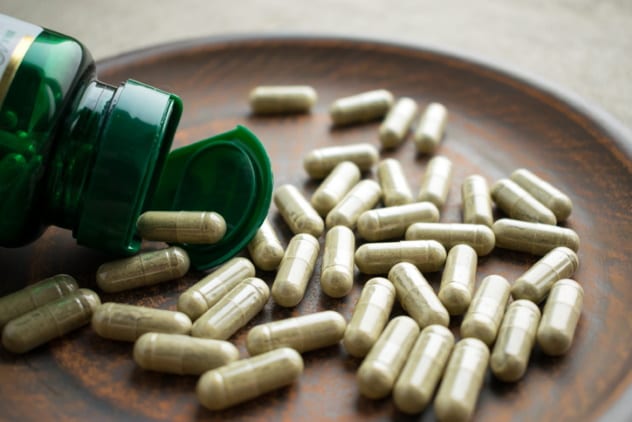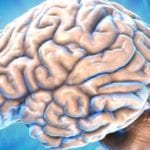 Our World
Our World  Our World
Our World  Crime
Crime 10 Dark Details of the “Bodies in the Barrels” Murders
 Animals
Animals The Animal Kingdom’s 10 Greatest Dance Moves
 Movies and TV
Movies and TV 10 Box Office Bombs That We Should Have Predicted in 2025
 History
History 10 Extreme Laws That Tried to Engineer Society
 History
History 10 “Modern” Problems with Surprising Historical Analogs
 Health
Health 10 Everyday Activities That Secretly Alter Consciousness
 History
History Top 10 Historical Disasters Caused by Someone Calling in Sick
 Animals
Animals 10 New Shark Secrets That Recently Dropped
 Movies and TV
Movies and TV 10 Forgotten Realities of Early Live Television Broadcasts
 Our World
Our World 10 Places with Geological Features That Shouldn’t Exist
 Crime
Crime 10 Dark Details of the “Bodies in the Barrels” Murders
 Animals
Animals The Animal Kingdom’s 10 Greatest Dance Moves
Who's Behind Listverse?

Jamie Frater
Head Editor
Jamie founded Listverse due to an insatiable desire to share fascinating, obscure, and bizarre facts. He has been a guest speaker on numerous national radio and television stations and is a five time published author.
More About Us Movies and TV
Movies and TV 10 Box Office Bombs That We Should Have Predicted in 2025
 History
History 10 Extreme Laws That Tried to Engineer Society
 History
History 10 “Modern” Problems with Surprising Historical Analogs
 Health
Health 10 Everyday Activities That Secretly Alter Consciousness
 History
History Top 10 Historical Disasters Caused by Someone Calling in Sick
 Animals
Animals 10 New Shark Secrets That Recently Dropped
 Movies and TV
Movies and TV 10 Forgotten Realities of Early Live Television Broadcasts
10 Ways You Might Be Hurting Your Brain
Our brains are an incredibly important part of our bodies. They give us our personality, thoughts, and emotions and enable us to interpret and interact with the world around us. It’s an organ we can’t get a transplant for, so it’s incredibly important that we take care of the one we have right now.
Unfortunately, there area lot of ways to hurt our brains, some of which may be surprising. So let’s take a look at some of the ways a brain can be harmed, sometimes permanently, and (ideally) do just the opposite.
10 Not Exercising Enough

We need to exercise. Yes, it’s tough, it takes time, and maybe it’s boring, but we need it. Our bodies need it. It’s recommended that we have at least 30 minutes of moderate exercise a day. If, like everyone else these days, it seems a burden to dedicate a whole half hour to yet another task, don’t worry. Short bursts of exercise are great. Maybe take the stairs instead of the elevator. Get up from the desk and walk around the office. Take the dog for a walk when you get home.
There is evidence that exercising like we are supposed to will also help with memory. It is actually one of the very few memory enhancers that has good evidence backing it up. Don’t worry about having to follow a certain routine or perform exercises that you hate or cannot physically do; all you need to do is be sure to sweat. Working up a good sweat is key.
A good type of workout to focus on is aerobic exercise. As we get older, our brains actually decrease in size, by approximately five percent every ten years. Aerobic exercise is great for keeping that heart rate up and pumping more oxygen throughout your body. As we exercise, our bodies produce a chemical, brain-derived neurotrophic factor, that helps fight this decrease and maintain our cognitive functions.[1]
9 Taking Those Memory-Enhancing Supplements

All those memory-enhancing supplements that are advertised everywhere? Yeah, generally speaking, the only thing they enhance is the wallet of the manufacturer. There’s not much, if any, reliable evidence that these supplements are actually helping us unless we are actually deficient in a vitamin.
The evidence also shows that while supplements might not have much benefit, they still carry risk. Do you know how supplements are regulated in the United States? As long as the manufacturer follows good manufacturing processes, claims to have supporting research, don’t make specific medical claims, and includes a disclaimer on the label, they’re good to go.[2] The Food and Drug Administration doesn’t actually follow up and evaluate the research of any supplement unless evidence comes to light that it’s dangerous. So as long as the supplement only slightly harms people, not enough to really gain attention, then it will probably never be noticed by the FDA.
In addition to these supplements probably not helping us, and maybe harming us, they might also interact with other medicines we are taking. Be sure to talk with your doctor before using herbal supplements so that they can help you avoid some potentially nasty side effects.
8 Can’t Get Enough Of Those Cigarettes

When we smoke, we don’t just hurt the brain; we’re actually causing harm to almost every organ in our bodies. Although the damage to all of these organs can have an effect on the brain as well, let’s focus on what specifically happens to the brain.
It’s probably not a surprise to you that cigarettes have nicotine, but did you know that nicotine actually causes your brain to change? It’s true. Cigarettes flood our brains with so much nicotine that they actually build more receptors to handle it all. Now that our brains have all these receptors, if we don’t keep them happy, then we’ll go into withdrawal and probably be smoking again before long.
Having a ton of nicotine receptors isn’t all that happens to our brains. Research has shown that people who smoke have, on average, a thinner cortex than those who don’t smoke.[3] This is huge because the cortex (aka the cerebral cortex) is where the brain processes memory, language, and perception. As the cortex shrinks, the brain’s abilities in those areas also shrinks. Unfortunately, the problem doesn’t completely go away after someone stops; come cortical thickness will be restored but not all.
7 Enjoying Alcohol A Bit Too Much

Alcohol has benefits for our health, as you probably know. Maybe you even think of this fact every time you refill your glass of wine or take another shot of whiskey. Unfortunately, as in all things, too much alcohol is bad for you.
How much is too much, though? Studies show that two drinks a day is the maximum amount that doesn’t cause harm. But how much is a drink? For beer, it’s 12 fluid ounces, assuming the beer is five-percent alcohol by volume (ABV). For wine, it’s 5 fluid ounces at 12-percent ABV. For 80-proof spirits, like whiskey, it’s just 1.5 fluid ounces. Take each of those measures and multiply by two to see just where the limit should be each day. So that’s the limit, but what really happens if you go over that?
There’s a lot that can happen if we drink too much. We can develop high blood pressure, have a stroke, or cause damage that leads to heart failure.[4] Brains desperately need a good, steady flow of blood in order to function properly. If we start messing with that flow through damage to our heart, then our brain will suffer the consequences.
6 Indulging A Bit Too Much In The Sugary Stuff

Our bodies need sugar, in the form of glucose. The brain, as the most energy-hungry organ in the body, needs a lot of sugar. Half of the sugar needed by the body goes to the brain. The brain uses the energy from that sugar to power neurotransmitters, which facilitate communication throughout the brain and are fundamental for memory and learning. If a brain is low on sugar, then these abilities suffer. So we should make sure to give our brains an abundance of sugar, right? No. I’m really sorry, but no.
Having too much sugar in the diet, by virtue of leading to weight gain, can cause the body to develop a resistance to insulin. Insulin is a hormone that the body uses to regulate its blood sugar levels. That’s why insulin is so important for people with diabetes. Unfortunately, if the sugar intake causes changes in insulin levels, then that can change how cells use and store sugar.[5] This change affects how the neurons use sugar and therefore how they facilitate communication throughout the brain.
In case you’re curious, the worst kind of sugar we can have is high-fructose corn syrup. Unfortunately, food companies use this in so many types of foods that it’s extremely difficult to avoid.
5 Burning The Midnight Oil A Little Too Much

We all need sleep. There’s no getting around it. We can fight it all we want, but eventually, sleep will find us. Fortunately, sleep is a good thing; it helps us form new memories and learn through the creation of pathways in the brain. Sleep also helps remove toxins that build up in our brains while we are awake. Adults need seven to nine hours of sleep on average.
Unfortunately, the demands of life step in and make sleep seem not that important. We have some great party to attend, a school project to finish, or a virtual opponent to crush in some video game. We can just catch up on sleep later, right? If we get a few hours, then we’ll have a tough day tomorrow, but it’ll all get fixed tomorrow night.
Sadly, that’s not really the case. This lack of sleep can cause lasting harm to the brain. Every night that sleep is avoided is another night that the brain won’t effectively form new memories and store needed information. Depression can start to form, which may further feed insomnia. Lack of sleep can also increase appetite, which can lead people to eat more (potentially sugary) foods and develop obesity.[6]
4 Being A Homebody

Did you know that spending time with family and friends is important for your brain? It’s true. Being social can strengthen your brain and decrease the risk of dementia. How does that work? Having positive social engagements improves mental health, thus improving our outlook and reducing the risk of depression, which is certainly known to have a negative effect on the brain. Actively engaging with people also helps to improve your memory and other cognitive skills.
What’s even better is if you pair social engagement with physical activity. Going for a walk with someone in the park, attending a class at a gym, or visiting a museum allows you to engage socially and hit your exercise goals. It’s a two-for-one deal!
All of this social engagement keeps your mind active. An active mind is key to fighting dementia. It’s suspected that older people have a harder time switching between active thinking and daydreaming, which can then lead to weakening of the mind.[7] With socialization, new memories are gained, information is shared, and then when we sleep, our brains can assimilate this data and form new connections and strengthen others.
That doesn’t mean that we should always be socially active, of course. Peaceful, quiet time at home can have a tremendous value. Just make sure that there is a balance.
3 Not Taking Medicine When We’re Supposed To

Blood is incredibly important to the brain. That’s obvious, right? Our brains need a constant flow of blood and sugars to keep operating, and any disruption or change in the flow can have a significant effect.
If someone has been diagnosed with hypertension or diabetes, there’s a good chance they are taking medicine every day to keep it under control. If some doses are skipped, that can cause premature damage to the brain and blood vessels. Making certain that medicine is taken at the correct times, without forgetting a dose, can keep the blood flowing correctly and delay the progression of disease.
Delaying such progression is important. Studies have shown that people with type 2 diabetes are more likely to have vascular and Alzheimer’s dementia.[8] These people are also more likely to have cardiovascular disease and hypertension, which affect the flow of blood to the brain.
2 Lost In A Daydream

Keeping brains active is important to their survival. Brains need input and new information to process in order to continue building and strengthening connections. As said earlier, the more often brains, especially older brains, work to switch between focused and unfocused states, the harder it might become to keep switching.
In fact, research has shown an amnesic effect to daydreaming. The farther your mind travels from where you are now, the greater the effect, and the harder it is to remember what happened before the daydream. There was a study which showed that participants who were asked to daydream about a very recent event (a few hours ago) were better at remembering words they’d just been shown than people who daydreamed of events from weeks ago.[9]
1 Enjoying Some Cannabis

Cannabis has many, many uses. It can make people feel good, relaxed, pain-free, and so on. Unfortunately, it can also impair memory. Research has historically had a difficult time determining the exact effects that cannabis has on memory, but there are effects.
These effects are especially noticeable the younger the person is. Studies have indicated that brains exposed to cannabis at a young age continue to show some impact to their cognitive functions later in their life. Thankfully, it appears that the effect on young brains is not completely permanent. While young adults see reduced cognitive function during frequent use, the reduction diminishes once they stop consuming the drug.[10]
I’m a software engineer with a love of learning.
Read about more surprising ways the brain can be affected on 10 Ways Technology Rewires Our Brains and 10 Ways Video Games Affect Your Brain.








